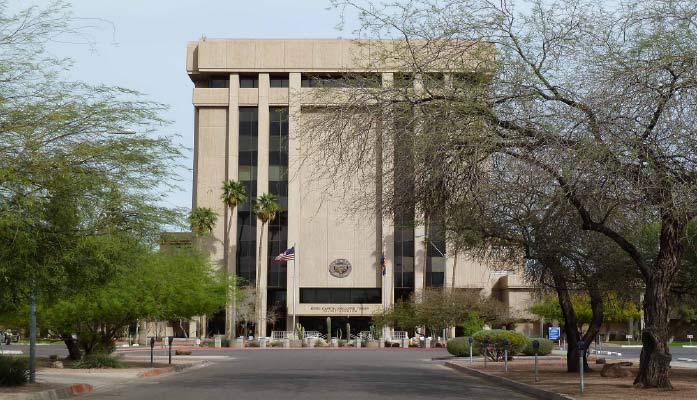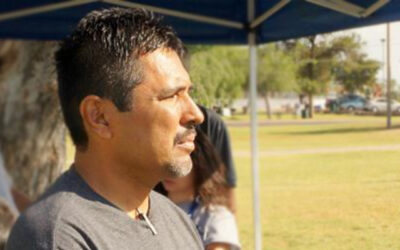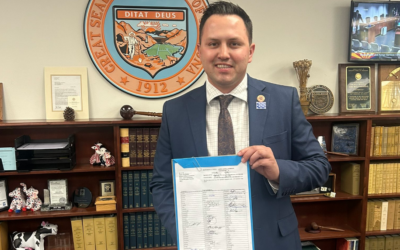By Terri Jo Neff |
CORRECTION: The bill still needs to be considered in the Senate. The “win” is confined only to the House vote as of 9:30 a.m., on June 29.
Back in January, on the second day of the legislative session, Sen. Warren Petersen and 27 other legislators introduced Senate Concurrent Resolution 1003 in hopes of garnering voter support to rein in a governor’s emergency powers.
It took more than five months, but the effort by Petersen (R-LD23) and the co-sponsors of SCR1003 paid off last week. The result – voters will decide in November 2022 whether to approve a constitutional amendment that ensures the legislature has a say after a governor issues a state of emergency.
A governor currently has power to declare a state of emergency for conditions of “disaster or extreme peril to the safety of persons or property within the state caused by air pollution, fire, flood, epidemic, riot, earthquake or other causes that are likely to be beyond the control of any single county or municipality.” Such a declaration is only terminated by proclamation of the governor or a concurrent resolution of the legislature.
The legislature, however, might not be in session when a state of emergency is issued.
SCR1003 would constitutionally require a governor to call the legislature into special session within 10 days of proclaiming a state of emergency. And once assembled, the legislature could determine whether to enact laws or issue legislative orders to terminate or modify the governor’s emergency powers as well as the state of emergency.
Those legislative orders would have the same authority as a governor’s executive orders, according to a provision of SCR1003. Another provision addresses a concern raised during the COVID-19 lockdowns – how to conduct legislative business if lawmakers cannot make it to the floor of their chambers.
Remote voting is currently allowed but the head count conducted for determining a quorum is based on those legislators present in the building. But if SCR1003 is approved by voters, quorums could be counted based on remote-attendance by a lawmaker under certain situations.
That would ensure the legislature can do its constitutionally-mandated duties even if several members are not in the building.
One of the most impassioned SCR1003 floor speeches came from Rep. Jake Hoffman (R-LD12) who advocated during voting on June 25 not only in support of the concurrent resolution but also to end of the COVID-19 public health emergency Gov. Doug Ducey declared more than 15 months ago.
According to Hoffman, Arizona’s state of emergency statutes permit “the most draconian measures out of all the states except for one. That is abhorrent. That is terrible.” He added that current laws allows emergency powers which are “unchecked and out of control.”
SCR1003, Hoffman said, “is measured, it is reasonable, it does not overreach, and it does not eliminate the ability for emergency orders and emergency declaration.”
He also called on Ducey to put on end to Arizona’s COVID-19 public health emergency. “It is time for this emergency order to end, period, stop all. End of story, turn it off,” Hoffman said.
But legislators did more last week that just ensure SCR1003 gets before voters next year.
The House and Senate also passed SB1819 which includes a provision that ends a governor’s public health state of emergency after 120 days unless extended in whole or in part by concurrent resolution of the legislature. That provision of the bill will not apply to a state of emergency issued before Jan. 1, 2023.
Petersen, the bill’s prime sponsor, told AZ Free News both SCR1003 and SB1819 are important given Arizona’s rating as second worst in the nation for the balance of powers between the executive and the legislative branches when it comes to emergency orders.
“SCR1003 and SB1819 are needed to bring Arizona into balance like the rest of the nation,” Petersen explained. “The measure that goes to the voters is important because it brings the legislature into session to consider any emergency orders issued. Meanwhile, SB1819 that we passed is important because it terminates those orders after four months.”
The two measures work hand in hand, Petersen noted.
“One makes sure the legislature has a voice in emergency orders from the start. The second makes sure that they don’t last forever,” he said.








